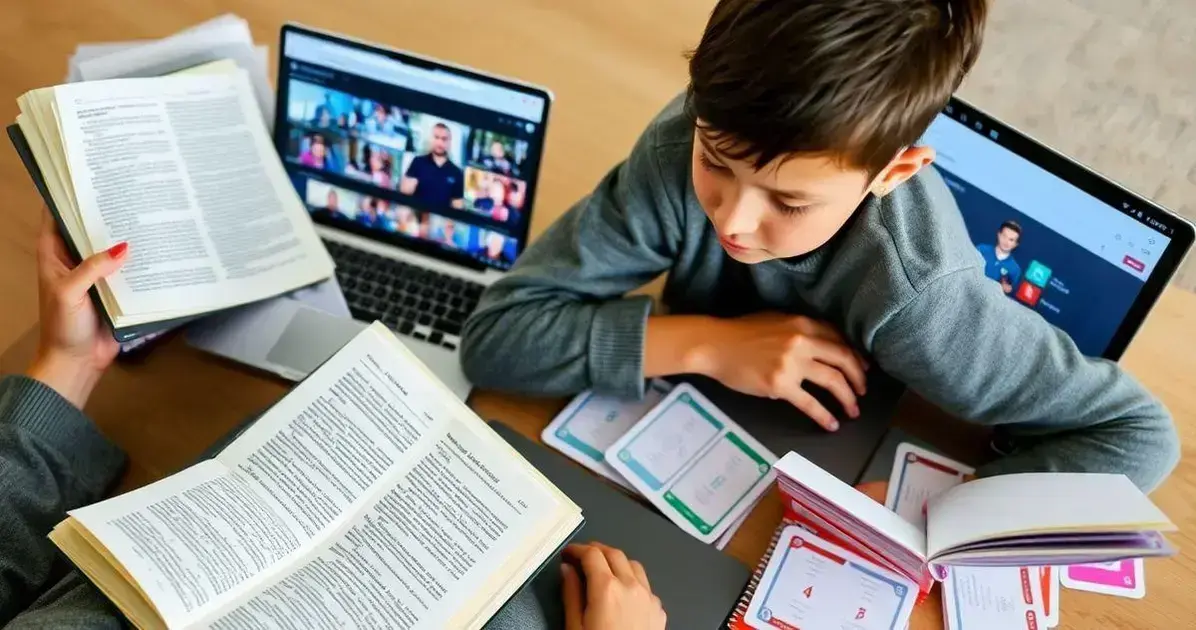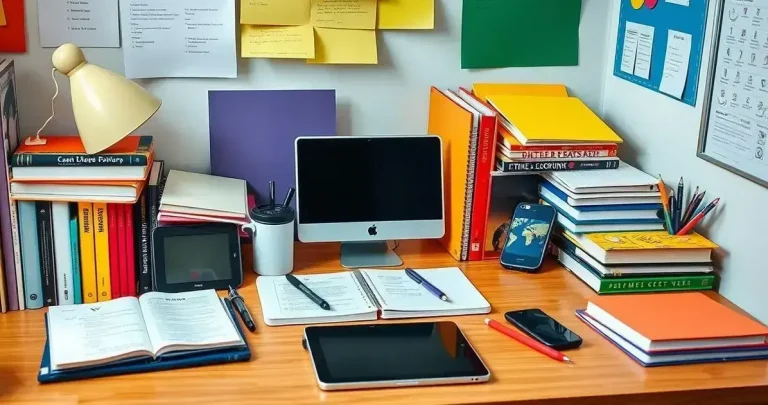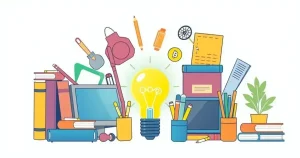Anúncios
Using a variety of study materials can help boost your learning.
Different resources, like textbooks, videos, and flashcards, provide multiple ways to understand a topic.
Mixing them can make studying more interesting and engaging.
Anúncios
It’s also important to personalize your study materials by choosing resources that match your learning style.
Lastly, don’t hesitate to use technology to enhance your study experience.
Study materials play a vital role in achieving academic success.
Anúncios
With the right resources and methods, anyone can unlock their full learning potential.
Types of Study Materials Available
There are many types of study materials available to help students learn. Textbooks are one of the most common types.
They provide detailed information on a subject and come with exercises to check understanding.
Many students find textbooks helpful because they are comprehensive and structured.
Another popular type of study materials is online resources. Websites, videos, and apps offer interactive content that can make learning fun.
These digital tools often include quizzes and flashcards, allowing students to test their knowledge in real time.
Lastly, study guides and notes are vital materials too. They focus on key concepts and help students review important information quickly.
Many learners create their own notes or use study guides made by others. This way, they can stay organized and focus on what really matters for their tests.
Choosing the Right Study Materials
Choosing the right study materials is important for effective learning. Start by thinking about your learning style.
Are you a visual learner who prefers videos and charts, or do you learn better by reading? Knowing this will help you pick materials that match how you learn best.
Next, consider the subject or topic you are studying. Some materials are better for certain subjects.
For example, textbooks are great for detailed explanations, while online quizzes are perfect for quick reviews.
Look for resources that are specifically designed for the subject to ensure you get the most relevant information.
Finally, check the quality of the study materials you choose. Look for reviews or recommendations from teachers and fellow students.
High-quality materials will be clear, well-organized, and recent. When you use the right materials, you set yourself up for success in your studies.
Digital vs. Physical Study Materials

When it comes to study materials, students often wonder about the choice between digital and physical copies.
Digital materials, such as e-books and online resources, are easily accessible on devices like tablets and computers.
This means you can study anywhere without carrying heavy books. Many digital resources also include interactive features that can make learning more engaging.
On the other hand, physical study materials like textbooks and printed notes have their own benefits.
Many people find it easier to focus when reading from a book rather than a screen.
With physical materials, you can take notes in the margins and highlight important sections, which can help with memory retention.
Some students feel that having a physical book makes it easier to study for long periods.
Ultimately, the choice between digital and physical study materials comes down to personal preference.
Think about how you learn best and what keeps you motivated.
Many students find a mix of both types can provide a balanced approach, combining the convenience of digital tools with the tactile experience of physical books.
How to Organize Your Study Materials
Organizing your study materials is key to effective learning. Start by gathering all your materials in one place.
This means collecting textbooks, notes, and any digital resources you use.
Once everything is together, you can begin sorting through them based on subjects or categories.
Consider creating folders or binders for each subject to keep everything neat and easy to find.
After sorting, think about how you can make your materials more accessible. For physical items, label your binders or folders clearly.
For digital materials, create a dedicated folder on your computer or cloud storage that has all your relevant files.
Use descriptive names for your documents, so they are easy to locate later. Spending time organizing now will save you stress later on.
Lastly, review and update your organization system regularly. As you complete assignments or change subjects, adjust your materials accordingly.
Keeping your study materials up to date helps ensure you always have what you need at your fingertips.
This way, you can focus more on studying and less on searching.
Integrating Study Materials into Your Routine
Integrating your study materials into your routine can make learning easier and more effective.
Start by setting aside specific times each day dedicated to studying. This helps create a habit, making it easier to remember to use your materials.
By having a regular study schedule, you can focus better and cover more content over time.
Next, consider combining your study materials with your daily activities.
For example, you can listen to educational podcasts or audiobooks during your commute. You can also review flashcards while waiting for your next class.
These small actions let you make the most of your time and keep learning even when you’re busy.
Finally, be flexible and adjust your routine as needed. If you find that certain study materials work better at different times, feel free to switch things around.
The goal is to make studying part of your lifestyle. With consistent effort, integrating study materials into your routine will help you achieve your academic goals.
Tips for Maximizing Study Materials Effectiveness

To maximize the effectiveness of your study materials, actively engage with them rather than passively reading.
For example, when you read a textbook, take notes or summarize key points in your own words.
This process helps reinforce your understanding and memory. Asking questions as you study can also deepen your comprehension of the topic.
Another valuable tip is to use a variety of study materials.
Mixing textbooks, videos, and interactive apps can keep studying interesting and cater to different learning styles.
This approach not only prevents boredom but also helps you understand concepts from multiple viewpoints, enhancing retention.
Finally, practice makes perfect. Regularly testing yourself with quizzes or flashcards can help you gauge your understanding and pinpoint areas that need more attention.
Schedule short review sessions where you go over past topics. These techniques can boost your confidence and prepare you better for exams.
When studying effectively, having the right study materials is essential.
Begin by identifying what subjects you need to focus on and gather resources that cover those topics thoroughly.
Look for textbooks, online articles, and educational videos that explain the concepts clearly. This will help you get a solid understanding of the subjects you are tackling.
Next, organize your study materials in a way that makes them easy to use.
Create a study schedule that allows time for each subject, and ensure your materials are readily accessible.
If you use digital resources, bookmark important pages or download necessary files to have them available when needed.
Keeping your materials organized can prevent distractions and help you stay focused.
Finally, review your materials regularly to reinforce your learning. Set aside time each week to go over notes and practice problems.
This repetition will help information stick and make it easier to recall during exams.
Remember, effective studying is not just about the materials you use but also how you use them.







